General observations

- Author: United Nations Office on Drugs and Crime
- Main Title: State of Implementation of the United Nations Convention Against Corruption , pp 5-11
- Publication Date: January 2018
- DOI: https://doi.org/10.18356/fc19072e-en
- Language: English
In ratifying the United Nations Convention against Corruption, States parties have made a significant commitment towards fighting corruption and implementing the necessary reforms in their domestic legal and institutional frameworks, even if progress is sometimes observed to be slow. Several countries have drafted or introduced new legislation for the purpose of fulfilling their criminalization and law enforcement obligations under chapter III of the Convention (e.g., widening the range of and increasing the penalties for corruption offences; aligning national provisions regarding the definition of public officials with article 2 of the Convention and, in particular, equating the treatment of members of parliament and other public officials; introducing the offence of foreign bribery; criminalizing self-laundering; introducing a regime governing the liability of legal persons for offences established in accordance with the Convention; expanding the protection of witnesses and victims; and strengthening the mandates and functions of specialized anti-corruption authorities). In this context, concepts that were new in some jurisdictions, such as “illicit enrichment”, were analysed in order for States parties to gain an understanding of their content and enable the implementation of the relevant Convention provisions.
-
From This Site
/content/books/9789213630969s007-c001dcterms_title,dcterms_subject,pub_keyword-contentType:Journal -contentType:Contributor -contentType:Concept -contentType:Institution105

